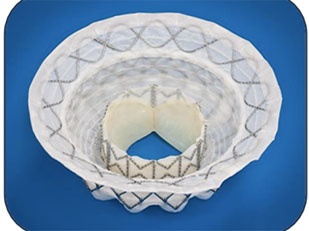Heart valve repair or replacement
Our cardiothoracic surgeons at Spectrum Health offer a wide range of surgical treatments for patients requiring heart valve repair or replacement. Replacing or repairing your valve can either be done through a minimally invasive approach or traditional open heart surgery. Spectrum Health has a robust minimally invasive cardiac surgery program. Minimally invasive surgeries include:
- Mini sternotomy
- Robotic surgery using the da Vinci XI robot
- Transcatheter valve replacement
Robotics for mitral valve disease
The Intuitive DaVinci Xi robot is an amazing computer-enhanced robotic assistance system. We have been performing robotic heart surgeries since 2008. Our cardiovascular surgeons offer a wide variety of these procedures in the largest program of its kind in West Michigan.
The combined capabilities of precision control, 3-D vision and minimally invasive entry allow eligible patients to spend less time recuperating and offer a faster return to a normal lifestyle. Robotic assistance allows qualifying patients to have smaller incisions, eliminating the need to split the breastbone. This type of surgery is not an option for everyone. If a minimally invasive approach is expected to provide a safe, effective alternative to the patient, it is offered.
10% of our mitral valve surgery cases are done robotically compared the 1.59% nationally (STS data).
Our structural heart team also offers treatments for mitral valve replacements such as:
- Balloon mitral valvuloplasty for mitral valve stenosis
- Percutaneous MitraClip placement for severe mitral regurgitation for patients at high or extreme risk for open heart surgery
The Structural Heart team can also treat failed bioprosthetic mitral valves via a transcatheter approach utilizing the Edwards Sapien valve system.
Aortic valve surgery
Our cardiothoracic surgery and structural heart team perform open heart surgery, minimally invasive surgery, transcatheter aortic valve replacement including valve-in-valve replacement, balloon aortic valvuloplasty and bicuspid aortic valve surgery.
Through a comprehensive diagnostic evaluation, our multidisciplinary team of cardiothoracic surgeons, interventional cardiologists, physician assistants, nurse coordinators, advanced imagers, and radiology technicians will review old and new studies on every patient and choose best treatment plans. With the recent approval of TAVR (transcatheter aortic valve replacement) in low-risk patients, shared decision making is a process in which clinicians and patients work together to make decisions and select treatment and care plans based on clinical evidence.
In 2021 Spectrum Health performed the second highest volume of TAVR procedures in the state of Michigan.
Janet's story
Treatment options

Percutaneous aortic valvuloplasty is a therapy to alleviate symptoms or a bridge to either surgical or transcatheter aortic valve replacement for patients with degenerative valve disease.
With this procedure, a balloon dilation catheter is inserted through an artery in the groin and advanced into the heart. When the catheter reaches the valve, a balloon at the end of the tube is inflated. The balloon widens the valve opening. The goal of the procedure is to reduce the severity of stenosis. Patients are usually awake for these procedures under local anesthesia.

Percutaneous mitral valve clip therapy (MitraClip) is available to patients with severe mitral valve regurgitation. MitraClip procedures are indicated for patients who are deemed to be poor candidates for open heart surgery.
During the procedure, a catheter using imaging equipment is inserted into the groin and directed through the femoral vein to the affected area of the heart. The clip is then guided into place and attaches to the leaflets of the mitral valve. The clip will grasp the leaflets, creating a double orifice, reducing the degree of regurgitation.

With this procedure, interventional cardiologists and cardiothoracic surgeons work together to replace a diseased aortic valve with an artificial valve.
TAVR may be an option for patients at intermediate, high or extreme risk for open heart surgery. TAVR involves inserting a catheter through an artery in the leg or chest and advancing it to the heart and your aortic valve. Once in place, the catheter delivers a self-expanding prosthetic valve into the aortic valve. The new valve helps the blood flow properly by fully opening and closing at the correct time. Recovery is significantly faster than traditional open heart surgery.
Spectrum Health is one of the highest volume TAVR centers in Michigan. The experience and high number of procedures we perform translates into high quality care

Now, Spectrum Health is one of the first hospitals in the area to investigate the Medtronic Intrepid transcatheter mitral valve replacement (TMVR) system, a minimally invasive potential alternative to conventional open-heart mitral valve surgery.

Through the APOLLO Trial, Spectrum Health will study the Intrepid TMVR system in patients who have severe symptomatic mitral regurgitation, and are either a candidate for, or ineligible for, conventional valve surgery.
